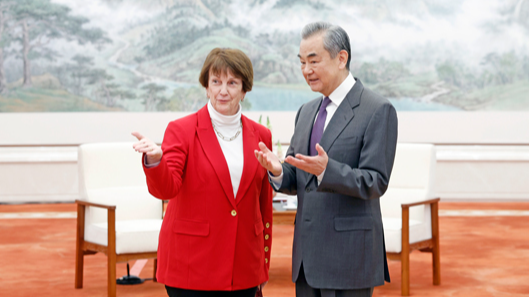Chinese Foreign Minister Meets Susan Elliot to discuss US-China Relations.
China has expressed optimism regarding the future of China-U.S. relations, particularly with the incoming U.S. administration. During a recent meeting with a delegation from the National Committee on American Foreign Policy (NCAFP) led by its President, Susan Elliot, Chinese Foreign Minister Wang Yi emphasized the importance of a stable and constructive approach to bilateral ties. Wang, who is also a member of the Political Bureau of the Communist Party of China Central Committee, articulated China’s hope that the new administration will navigate its initial steps in U.S.-China relations thoughtfully and effectively. Wang highlighted that China’s foreign policy, particularly towards the United States, has been characterized by stability and continuity. This consistency reflects China’s determination and credibility as a significant global player. He reiterated that regardless of changes in the U.S. political landscape, China remains committed to enhancing its relationship with the U.S. based on principles of mutual respect, peaceful coexistence, and win-win cooperation.
In his remarks, Wang referenced statements made by Chinese President Xi Jinping during a recent meeting with U.S. President Joe Biden at the APEC Economic Leaders’ Meeting in Lima, Peru. Xi’s comments underscored China’s enduring goal of fostering a stable, healthy, and sustainable relationship with the United States. Wang reiterated that this commitment remains unchanged, emphasizing China’s dedication to safeguarding its sovereignty, security, and development interests while promoting friendship between the peoples of both nations. The future trajectory of China-U.S. relations largely hinges on decisions made by the United States, according to Wang. He expressed hope that the U.S. will engage with China constructively and work collaboratively to find common ground. Wang cautioned against any wavering in efforts to maintain steady relations, urging the U.S. side to take proactive steps to stabilize bilateral ties.
Wang emphasized that it is crucial for the U.S. to adopt a correct strategic perspective regarding China’s development and revitalization, which he described as an inevitable process. He clarified that China does not aspire to challenge or replace the United States; rather, it seeks a cooperative relationship where both nations can thrive without succumbing to competitive animosities. In advocating for continued dialogue between the two countries, Wang acknowledged that while conversations may not resolve all issues, they are essential for fostering mutual understanding and preventing miscalculations that could escalate tensions. He stressed that both nations must respect each other’s boundaries and avoid crossing established red lines in their interactions.
A significant point raised by Wang was related to Taiwan, which he asserted falls within China’s internal affairs. He urged the United States to honor its commitments regarding the one-China principle and respect China’s chosen path for development, which includes its legitimate rights.Wang also underscored the importance of cultural and people-to-people exchanges between China and the U.S., asserting that such interactions should not be hindered or reversed. He indicated that China would continue to support initiatives facilitating personnel exchanges between the two nations and welcomed increased visits from U.S. citizens across various sectors.
The NCAFP delegation echoed these sentiments, expressing their mission to strengthen U.S.-China relations by seeking common ground and enhancing mutual understanding. They noted that historical crossroads have often defined U.S.-China relations, emphasizing that effective communication during this transitional period for the U.S. administration is critical for both countries and global stability. The delegation highlighted the necessity for ongoing strategic dialogue and robust people-to-people exchanges as fundamental components for stabilizing bilateral ties. They reiterated their commitment to acting as a bridge in fostering positive developments in U.S.-China relations. Both Chinese officials and representatives from NCAFP conveyed a shared understanding of the challenges facing U.S.-China relations while also expressing hope for constructive engagement moving forward. The emphasis on dialogue, mutual respect, and cooperation reflects a collective aspiration for a more stable and beneficial partnership between these two influential nations on the global stage.
Related Posts

















